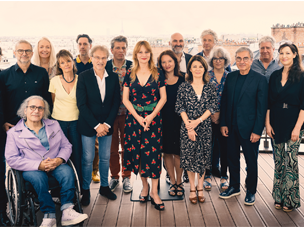If there is one word which readily falls from the lips of the Swiss-Italian composer, Oscar Bianchi, and is even more forcibly expressed in his music, it is "clarity". Whatever artistic colour his works take, they all share the same striking qualities: transparency, a sharpness of contours, intense activity, energy and virtuosity.

Even though Oscar Bianchi advocates the need to construct languages to overcome musical barriers, "transparency remains", he says, "a fundamental condition to ensure that a language, even a sophisticated one, can be interpreted by listening".
This is why the brilliance of his music has virtuosity as a corollary, or even as a necessity. This is not a virtuosity to test and glorify the performer but an element "commanding celebration". This exuberance which is, to some extent, his style, is not an end in itself. It is intended to create an energy, a generosity and a euphoric expression of celebration the aim of which, as much as the actual content of the work, is the freedom of the act of creating.
PROFOUND INSPIRATIONS
Related to the idea of a celebration, the ritual dimension of Oscar Bianchi's music is sometimes consciously and directly perceptible. The Matra (2007) cantata is typical of a piece which the composer wanted to infuse with a spiritual depth and which draws on two sources in particular to which he has made reference on many occasions: Indian spirituality, more specifically in this case the Shaivism tantric tradition, and the poetic-philosophical reflections of Lucretius, as preserved in the book De rerum natura. The works of Oscar Bianchi between 2007 and 2010 (Anahata Concerto, Ajna Prelude) express his desire "to define a form of existential wisdom on a musical level", free of any temptation to religiosity or any kind of exoticism. In Lucretius, it was atomism, based on the ideas of Epicurus, which attracted the composer's attention from an early age. However, one should refrain from creating a metaphor of a musical idea based on a single metric. Even in chamber music, a ritual backdrop invokes a dimension of depth. It is, he says, "one of the aspects of contemporary music which attracts me the most. We are here to exchange important, deep, meaningful things, and it is in so doing that a work of art can also take flight. Perhaps this is also what the work celebrates.
COURSES AND INFLUENCES
Oscar Bianchi was trained at the Milan Conservatory, Ircam and Columbia University. He is well of what he owes to the academic world but is wary of knowledge as total understanding. "Knowledge in itself, as in the ability to answer questions, is a typical Western exercise which can sometimes feel a little sterile", says the composer. "But if we put this knowledge to use for what we consider to be the good of society, a whole new field of expression opens up and with it a range of social functions." Oscar Bianchi believes in the master-disciple relationship and the notion of transference of a vision or an inspiration through "transpiration". As such, the support of Adriano Guarnieri in Milan or Tristan Murail in New York, as important as it is, does not translate into a direct musical influence. Trained in conducting a choir whilst discovering choral material through the practice of polyphonic writing, and therefore sensitive to the beauty of vocal counterpoint in a somewhat austere style, Oscar Bianchi does not shy away from a certain amount of vocal pyrotechnics, notably the style which illuminates his Ante litteram (2013), in which he once again aims to create jubilant music. Having grown up in Milan he was also exposed to opera. However, far from strictly adhering to the codes of the Bel canto tradition, he prefers a form of lyricism adapted to emphasise the very essence of the human voice, as can be heard in his opera Thanks to My Eyes (2011), and he remains very attached to a melodic-phonetic symbiosis which gives justice to the lyrics as much as to the voice.
ARTISTIC AMBITION
Even though Oscar Bianchi describes himself as an "intermediary" in the service of the music through which his works are realised, it is not in mimicry of the image of the romantic demiurge, the receptacle, in spite of themselves, of higher inspiration. It is rather that he considers that, the combination of his knowledge, imagination and skills for synthesis are capable of catalysing a creation process which is not confined to himself alone. Put in the perspective with the notion of a secular celebration, this representation of the creator espouses a certain form of humanism. A humanism relying on the power of artistic expression to rediscover language and, by questioning rhetoric, reconnect with an unmanipulated truth. "As European citizens, he says, we need to be confronted with reality as it is, and not the dynamic of media manipulation." The imperative of clarity and transparency which runs through the composer's work is that of a music which tends towards transcendence, not for its own sake, but as a means of discovery and sharing.
Pierre Rigaudière
- More informations about Oscar Bianchi
- Discover the works of the composer on spotify or Souncloud
Published September 24 2019


